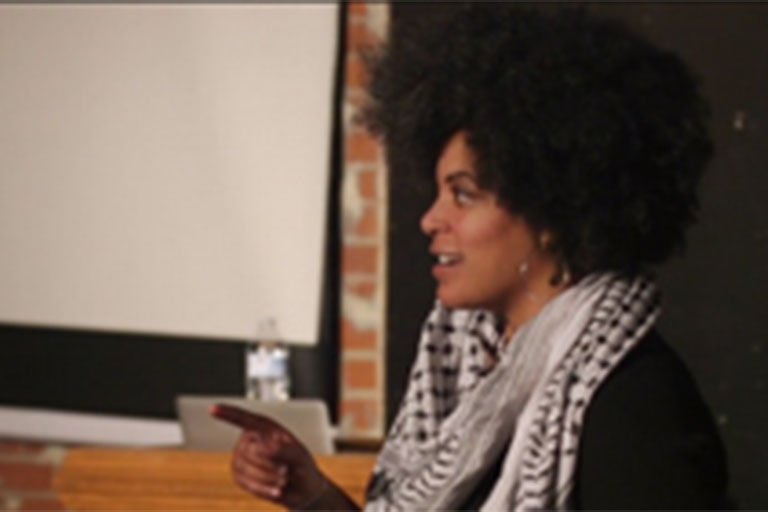Before the COVID-19 pandemic, Professor Amrita Myers and the Department of History’s Diversity Committee had planned to host the Social Justice in America Series (SJAS) in collaboration with the Office of the Vice President for Diversity, Equity, and Multicultural Affairs during the Spring semester. Postponed to fall 2020, the series will consist of four separate events: a voter registration drive, an in-person workshop led by Ash-Lee Woodard Henderson, co-executive director of the Highlander Research & Education Center, a town hall discussion with Henderson and several Bloomington citizens, and a closing fair with booths from 60 different campus and community organizations committed to social justice.
COVID-19 did not stop this important work from happening now. On April 9, members of the IU and Bloomington community participated in the series’ first virtual event. Over seventy people logged onto a private Zoom call with Henderson, moderated by Myers and members of the OVPDEMA Marketing and Communications team. Henderson herself suggested hosting a “Train the Trainer” workshop via Zoom once informed of the rescheduling of the SJAS events due to COVID-19.
“She graciously said, ‘how can I help?’ ‘How can we still keep things moving? Why don’t we do something remotely?’” “Henderson said that she ‘never considered her visiting Indiana to be a one and done deal’ and thinks ‘of this as being the beginning of an ongoing relationship.’ I am so grateful for Ash-Lee taking the time to do this workshop with us.”
Specially tailored for members of the IU and Bloomington community who are involved with various aspects of diversity, equity, and inclusion, “Train the Trainer” encouraged campus and community members to become more committed to and engaged with their work. Henderson led the group on a two-hour journey where they examined how they approach social justice and how they can better improve not only themselves but their work.
“[These participants] want to do better and learn more,” Myers said. “They are in positions of leadership. No matter where they’re at or where they’re starting from, they want to get to the next level, and we want to help them get there. We want to help them do better in their offices and their organizations. We want to help them do better by our students, by our city, by our community, and by our citizens.”
One of the main aspects of the “Train the Trainer” workshop was what Henderson called “A Utopian Vision.” In this thought experiment, Henderson asked participants to envision their perfect future. Continuing, Henderson revealed that one of the obstacles that participants experience is that they think too small. A person’s Utopian Vision should be their ideal future, but many participants only think of what they think they can do. For example, Henderson told the story of performing the same exercise with marginalized high school students who found themselves being harassed by the police several times a day. The students said that in their Utopian Vision, they would be able to confront the police regarding their actions, to which Henderson replied: “your Utopian Vision still has police?”
Designed to show participants that thinking small rarely achieves anything, the exercise demonstrates how important it is to come up with an ideal vision, because “if you cannot come up with a vision, then you cannot create a strategy.” Henderson linked this process to muscle memory, saying that by constantly and consistently thinking about Utopian Visions, people are more likely to develop strategies that will help society move closer to that vision.
Another impactful portion of the workshop was the commitment statements. Henderson asked participants to write down the phrase “I am a commitment to…” on a piece of paper and then follow it up with a personal statement to influence how the participant would move forward or live their life. For example, Henderson’s commitment was, “I am a commitment to living my best life without guilt, shame, or apology.”
“When you say ‘I am a commitment to,’ then all of a sudden the change starts with you,” Myers said. “Each of us has to be committed to making the change begin with us, and that made it hit home and personal to me. I like to think of myself as a person who is pretty conscious and pretty good on this diversity, equity, inclusion stuff, but she [Henderson] is not letting us get away with that. No matter where we start from, we can all get better. We can all do more. We can all push further.”
“What I enjoyed about it was that it wasn’t just us sitting there listening to Ash talking,” Myers said. “We were so active and so engaged, not just through a text chat function, but the fact that we were unmuting people so they could talk and participate, that we still were able to have an engaging session as if we were all in the same space, despite the fact that we were in our separate homes.”
Henderson will return to IU in person this fall for her SJAS workshop and town hall lecture, both scheduled for Thursday, October 1.


